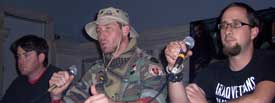How GIs organized in Iraq against the war
By
John Catalinotto
New York
Published Nov 26, 2006 10:06 AM
U.S. Army veterans of both wars against Iraq and from the Vietnam
War period and supporters of resistance inside the U.S. military
filled the Judson Memorial Church here on the evening of Nov. 17
to hear an update on current military resistance.
|
From left, anti-war Iraq War
veterans
Garett Reppenhagen,
Jeff Englehart and
Joe
Hatcher, Nov. 17.
WW photo: John Catalinotto
|
Featured speakers were Garett Reppenhagen, Jeff Englehart and Joe
Hatcher, who were stationed with the First Infantry Division in
Diyala Province in Iraq during 2004-2005 and spoke out, while
there, against the war and occupation. Now members of Iraq
Veterans Against the War (IVAW), the three took turns describing
the difficult atmosphere for dissent. “We had the sense of
overwhelming power over our heads,” said Reppenhagen,
“which made it hard to openly resist. We couldn’t go
to the latrine without our sergeant knowing about it.”
“There was no ‘behind the lines’ and no
sidelines,” said Englehart. “We were at very small
bases and under the constant scrutiny of commanders. We felt our
main role as dissenters was to bear witness to the American
people. Our big campaign was pasting the sticker, “Bush
lies, who dies?” all over the base. The commanders would
take down the stickers that were up front. But when we put them
in the corners and on the latrine doors, the soldiers would
quietly let them stay.”
The veterans are now speaking out at anti-war rallies and
strengthening the morale of the growing number of people who
protest occupation. What they showed was that even two years ago
military dissidence was possible in the U.S. Army, even in Iraq
itself.
Also at the meeting, Tod Ensign of Citizen Soldier announced that
A Different Drummer, a gathering place for GIs to discuss their
attitude toward the continuing war, had recently been established
in Watertown, N.Y., near Camp Drum, based on the model of the
coffee-houses that anti-war forces set up near military bases
during the war against Vietnam.
Tom Barton, editor of the Web-based daily newspaper GI Special,
chaired part of the meeting and reported that increased mail to
his site showed a growing opposition to the war within the
military.
The general tone of the meeting was that the Republican defeat at
the polls will not of itself end the war and that increased
action in the streets and especially in the barracks will be
needed.
Articles copyright 1995-2012 Workers World.
Verbatim copying and distribution of this entire article is permitted in any medium without royalty provided this notice is preserved.
Workers World, 55 W. 17 St., NY, NY 10011
Email:
[email protected]
Subscribe
[email protected]
Support independent news
DONATE


